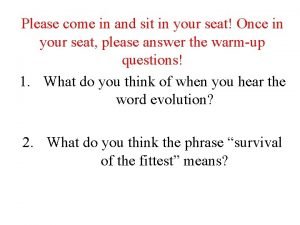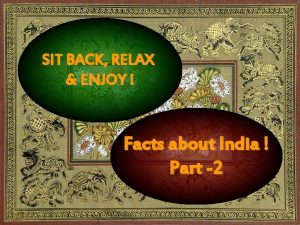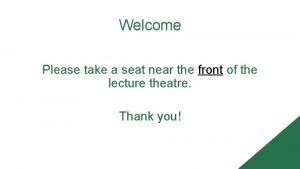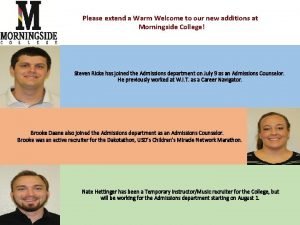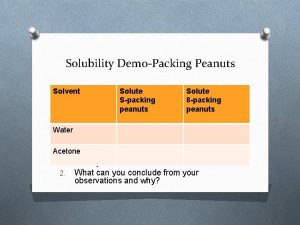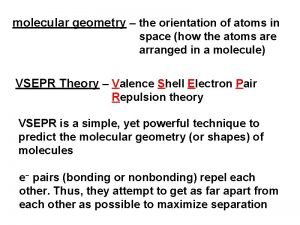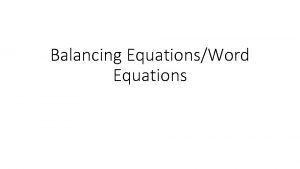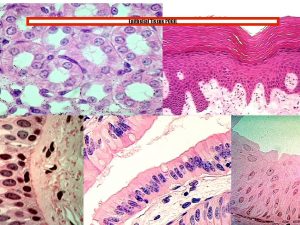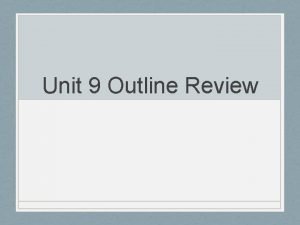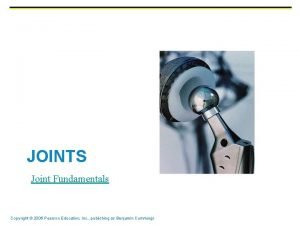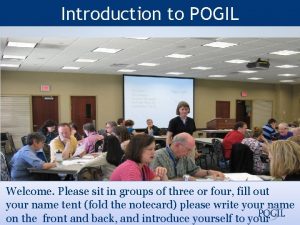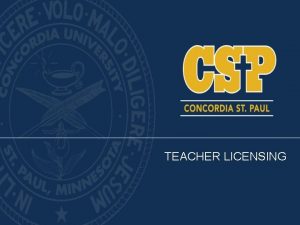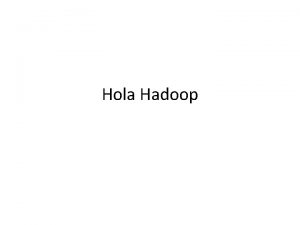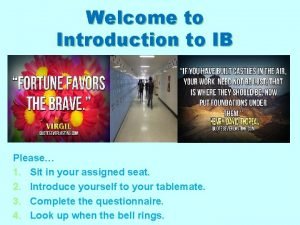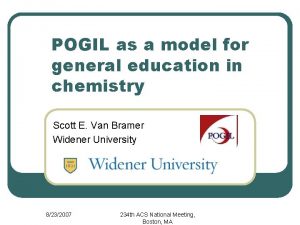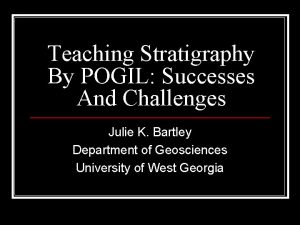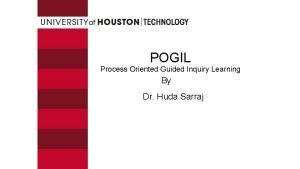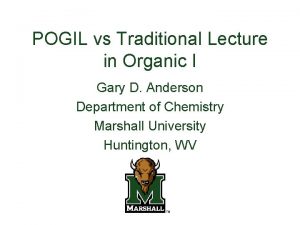Introduction to POGIL The Fundamentals Welcome Please sit


















































- Slides: 50

Introduction to POGIL: The Fundamentals Welcome! Please sit in groups of three or four, with people you do not know, and make the groups as heterogeneous as possible. Facilitator: Murray Jensen Copyright © 2018 The POGIL Project

Getting Started Managers: Look in the red folder; read and carry out the Instructions to Managers. 2 Copyright © 2018 The POGIL Project

Introduction to POGIL: The Fundamentals • The Facilitation Team • Murray Jensen – University of Minnesota 3 Copyright © 2018 The POGIL Project

Objectives and Outcomes This session is designed for those with limited or no previous exposure to POGIL. Participants will: • Engage in POGIL activities • Observe facilitation strategies • Learn about POGIL implementation at other schools • Discuss common barriers to implementation 4 Copyright © 2018 The POGIL Project

Objectives and Outcomes After attending this session, participants will be able to: • Name crucial elements of POGIL pedagogy and philosophy • List desirable student learning outcomes from a POGIL classroom • Create strategies to begin implementing POGIL in their classrooms 5 Copyright © 2018 The POGIL Project

The POGIL Project • Launched by sequential National Science Foundation (2003 -2012) and other grants • Based on curricular work done by a variety of like-minded people in the mid-1990 s • Became a not-for-profit organization in 2010 • The mission of The POGIL Project is to connect and support educators from all disciplines interested in implementing, improving, and studying student-centered pedagogies and learning environments. 6 Copyright © 2018 The POGIL Project

The POGIL Project is run by: • A Board of Directors • A Director (Rick Moog, Franklin & Marshall College) • A Steering Committee of experienced practitioners (eight college and high school faculty) • Eight part-time and full-time staff in the POGIL National Office (Lancaster, PA) 7 Copyright © 2018 The POGIL Project

The POGIL Project • Offers faculty development – More than 20 workshops each year for high school and college faculty – Institutes for workshop facilitators • Actively involves almost 1, 000 individuals each year – Workshop attendees, workshop facilitators, curriculum developers • Has touched thousands of people – More than 1, 000 people are implementing POGIL pedagogy across multiple disciplines 8 Copyright © 2018 The POGIL Project

A POGIL Classroom Experience 9 Copyright © 2018 The POGIL Project

Comprehension Question Assume that in Model 2 the Pension Fund purchases insurance for $2 billion per year from Bank B. In this case, how much profit or loss will the pension fund have made at the end of five years, assuming that Bank A fulfills its obligation? 1. $10 billion profit 2. $5 billion profit 3. $2. 5 billion profit 4. $0 profit 5. $10 billion loss 10 Copyright © 2018 The POGIL Project

Whole Class Discussion Incorporate reporting out of answers in a POGIL classroom 11 Copyright © 2018 The POGIL Project

Reflector’s Report Reflectors, report to your group: • One strength of the group and why it is important for an effective group • One area of improvement for the group and a possible way to make it 12 Copyright © 2018 The POGIL Project 2 Minutes

Sharing Your Reflector’s Report Any volunteers willing to share your Reflector’s Report with the workshop participants? 13 Copyright © 2018 The POGIL Project

Student Outcomes Other than content knowledge, what might your students gain from this type of learning environment? • Individually: 1 Minute • Group: 3 Minutes • Presenters report out 14 Copyright © 2018 The POGIL Project

What is POGIL? Process Oriented Guided Inquiry Learning 15 Copyright © 2018 The POGIL Project

What is POGIL? Process Oriented (Cooperative Learning): Develop Key Process Skills Process Oriented Guided Inquiry Learning 16 Copyright © 2018 The POGIL Project

Process Skills • • 17 Information Processing Critical Thinking Problem Solving Communication Teamwork Management Assessment Copyright © 2018 The POGIL Project

What is POGIL? Guided Inquiry (Constructivism): Learning Cycle Activities Process Oriented Guided Inquiry Learning 18 Copyright © 2018 The POGIL Project

ce Invent du de ind uce Learning Cycle Activities Explore Apply Orient 19 Close Copyright © 2018 The POGIL Project

What is POGIL? Process Oriented (Cooperative Learning): Develop Key Process Skills Guided Inquiry (Constructivism): Learning Cycle Activities Process Oriented Guided Inquiry Learning 20 Copyright © 2018 The POGIL Project

Information Processing Model Events Observations Instructor P e r c e p t i o n Storing F i l t e r Working Memory Students Previous knowledge Preferences Misconceptions • • Long. Term Retrieving Memory Biases Likes Dislikes Johnstone, A. H. (1997). Chemistry Teaching- Science or Alchemy? Journal of Chemical Education, 74, 262– 268. Gazzaniga, M. S. , Ivry, R. B. , & Mangun, G. R. (2008). Cognitive Neuroscience: The Biology of the Mind (3 rd ed. ). New York: W. W. Norton & Company. Copyright © 2018 The POGIL Project

Constructivist Model of Learning • “Learning is not the transfer of material from the head of the teacher to the head of the learner intact, [but] the reconstruction of material in the mind of the learner. ” • “It is an idiosyncratic reconstruction of what the learner. . . thinks she understands, tempered by existing knowledge, beliefs, biases, and misunderstandings. ” Johnstone, A. H. (1997). Chemistry Teaching—Science or Alchemy? J. Chem. Educ. , 74, 262– 268. 22 Copyright © 2018 The POGIL Project

New Paradigm • Knowledge results only through active participation in its construction. • Students teach other and they teach the instructor by revealing their understanding of the subject. • Teachers learn by this process. . . by steadily accumulating a body of knowledge about the practice of teaching. Teaching is enabling. Knowledge is understanding. Learning is active construction of subject matter. Elmore, R. F. (1991). Foreword. In C. R. Christensen, D. A. Garvin, & A. Sweet (Eds. ), Education for Judgment (pp. ix–xi). Boston, MA: Harvard Business School Press. 23 Copyright © 2018 The POGIL Project

Murray Jensen’s Slide Data Information Knowledge The “making sense” process 24 Copyright © 2018 The POGIL Project Wisdom

Guided Inquiry Approach • Students work in groups • Students construct knowledge • Activities use the Learning Cycle paradigm • Students teach, discuss and learn from other students • Instructors facilitate learning 25 Copyright © 2018 The POGIL Project

Meta Activities Meta-Activity: Process Skills • Complete page 1 and wait for your assignment for Model 2 8 Minutes • Report out 4 Minutes 26 Copyright © 2018 The POGIL Project

Meta Activities The instructor in the classroom facilitates the development of process skills • Complete Meta Activity: 6 Minutes Classroom Facilitation • Report out 27 Copyright © 2018 The POGIL Project

Analysis of Student Outcomes Data on the use of POGIL in a variety of academic settings 28 Copyright © 2018 The POGIL Project

General Chemistry at Franklin & Marshall College • “Lecture”: • POGIL: F 1990–S 1994: n = 420 F 1994–S 1998: n = 485 • Sections of approximately 24 students • Same instructors • Students randomly placed Fall semester and designate preference Spring semester (but not guaranteed to get their choice) • Compare course grades (ABC’s vs. DFW’s) 29 Copyright © 2018 The POGIL Project

General Chemistry at Franklin & Marshall College Data from classrooms of Moog, Farrell, and Spencer Farrell, J. J. , Moog, R. S. , & Spencer, J. N. (1999). A Guided Inquiry Chemistry Course. J. Chem. Educ. , 76, 570– 574. 30 Copyright © 2018 The POGIL Project

Organic Chemistry at a Regional Liberal Arts College • Two sections--one lecture style, one POGIL-taught at the same time • Students randomly placed in sections • Common exams prepared and graded by both instructors • Compare course grades (ABC’s vs. DFW’s) 31 Copyright © 2018 The POGIL Project

Organic Chemistry at a Regional Liberal Arts College Randomized enrollment, different instructors, single exam given concurrently, prepared and graded by both instructors 32 Copyright © 2018 The POGIL Project

Anatomy & Physiology at King College (TN) • Spring 2008 – lecture • Fall 2008, Spring 2009, Fall 2009 – 3 semesters of POGIL (50% of lectures replaced with POGIL activities) • Same instructor • Compare course grade (AB’s vs. DF’s) and final exam grade distributions 33 Copyright © 2018 The POGIL Project

Anatomy & Physiology at King College (TN) A/B’s vs. D/F’s grades POGIL Final Exam LECTURE Brown, P. J. P (2010) Process-Oriented Guided-Inquiry Learning in an Introductory Anatomy and Physiology Course with a Diverse Student Population. Advances in Physiology Education, 34, 150 -155 34 Copyright © 2018 The POGIL Project

Organic Chemistry 1 at a Large Public University • Two sections--one lecture, one POGIL--taught at the same time • Students randomly placed in sections • Compare withdrawal rate and common exam scores – Final exam created solely by lecture instructor and administered to both groups 35 Copyright © 2018 The POGIL Project

Organic Chemistry 1 at a Large Public University Withdrawals & Common Final Exam Scores, Fall 2000 36 Copyright © 2018 The POGIL Project

Year-Long General Chemistry at a Small Liberal Arts College • 1993 ACS general chemistry final exam, approximately 40 students • Previous 10 years • Average percentage correct = 55. 5 • Highest average = 65. 2 (2001) • Lowest average = 47. 0 (2003) • POGIL class average percentage correct = 68. 5 (2004) 37 Copyright © 2018 The POGIL Project

Peer-Led Guided Inquiry at a Large Research University Comparison of common exam scores: PLGI Group with Control Group (taught by same instructor) Control Group • Three one-hour lectures/week • Capped at 190 students PLGI Group • Two one-hour lectures/week • One PLGI session/week • Capped at 100 students Lewis, S. E. , & Lewis, J. E. (2005). Departing from Lectures: An Evaluation of a Peer-Led Guided Inquiry Alternative. J. Chem. Educ. 82: 135– 139. 38 Copyright © 2018 The POGIL Project

Peer-Led Guided Inquiry at a Large Research University • Students work on POGIL chemistry activities in groups of four • Student group work is typically led by an undergraduate peer leader who: • Successfully completed general chemistry • Received training on how to lead groups in a guided inquiry style • Students and peer leaders review concepts via faculty-led guided inquiry 39 Copyright © 2018 The POGIL Project

Peer-Led Guided Inquiry Intervention Results Average Test Score Comparison of Average Test Scores 40 Copyright © 2018 The POGIL Project

Organic Chemistry 2 Pre-Quiz at a Large Public University • Classes of about 250 • Unannounced quiz given on first day of Organic 2 (written by a non-POGIL instructor) • Students had taken Organic 1 – With lecture (two different instructors) – With POGIL 41 Copyright © 2018 The POGIL Project

Organic Chemistry 2 Pre-Quiz at a Large Public University Organic 2 Pre-quiz Results (Lecture vs. POGIL Organic 1) Ruder, S. M. , & Hunnicutt, S. S. (2008). POGIL in Chemistry Courses at a Large Urban University: A Case Study. In R. S. Moog, & J. N. Spencer (Eds. ), Process-Oriented Guided Inquiry Learning: Copyright © 2018 The POGIL Project

Organic Chemistry 2 at a Midwest Liberal Arts College Comparison of grades in a single section of Organic 2 taught with lecture style • Some students took POGIL Organic 1 • Some students took lecture Organic 1 • Some students from each cohort did not enroll in Organic 2 • Compare grade distributions 43 Copyright © 2018 The POGIL Project

Organic Chemistry 2 at a Midwest Liberal Arts College Is Guided Inquiry Organic 1 better preparation for Organic 2 Lecture? Grade in Organic 2, Winter Quarter 44 Copyright © 2018 The POGIL Project

Undergraduate Biomechanics at Boise State University • Upper division Biomechanics (in Kinesiology Dept. ) • Large diversity of STEM preparation • Comparison of quizzes/tests and grades for lecture and POGIL • Same instructor 45 Copyright © 2018 The POGIL Project

Undergraduate Biomechanics: Boise State University Comparison of assessments for traditional (n = 52) and POGIL (n = 64) instructional methods. 90% 80% Mean % earned 70% 60% 50% Traditional 40% POGIL 30% 20% 10% 0% Quiz Tests Course S. R. Simonson & S. E. Shadle (2013). Implementing process oriented guided inquiry learning (POGIL) in undergraduate biomechanics: lessons learned by a novice, J. STEM Educ. 14(1): 56 -63. 46 Copyright © 2018 The POGIL Project

Undergraduate Biomechanics: Boise State University Percent of students earning a particular letter grade using traditional lecture instruction (n = 52). Percent of students earning a particular letter grade using POGIL instruction (n = 64). 1. 9 9. 6 3. 1 1. 6 30. 8 18. 6 A C A 40. 6 C 36. 5 B B 21. 2 A B C D F 34. 4 S. R. Simonson & S. E. Shadle (2013). Implementing process oriented guided inquiry learning (POGIL) in undergraduate biomechanics: lessons learned by a novice, J. STEM Educ. 14(1): 56 -63. 47 Copyright © 2018 The POGIL Project

Murray’s Slide • • • Education research Measurement and evaluation in education Smart students will always succeed Pumps vs. Filters Student gains. . fewer lower scores Seems to be better for females • Freeman S. , S. L. Eddy, M. Mc. Donough, M. K. Smith, M. P. Wenderoth, N. Okoroafor, H. Jordt. 2014. Active learning increases student performance across STEM disciplines. PNAS 111 (23): 8410 -8415. www. pnas. org/cgi/doi/10. 1073/pnas. 1319030111 48 Copyright © 2018 The POGIL Project

Questions? • Take one minute to write down any questions that you have, then think about which question is most important to you. • As a group, take three minutes to discuss your questions and come up with a list of up to three questions you would like to ask, in rank order of importance. • Answers to many questions are in the Fundamentals of POGIL. 49 Copyright © 2018 The POGIL Project

Wrap Up 50 Copyright © 2018 The POGIL Project
 Greensboro sit in significance
Greensboro sit in significance Please sit down and your seat belts
Please sit down and your seat belts Sit on your seat
Sit on your seat Strangers like you that pictured countenance
Strangers like you that pictured countenance Please sit down and your seat belts
Please sit down and your seat belts Please sit at the table
Please sit at the table Will you please sit at the table
Will you please sit at the table Please sit back and relax
Please sit back and relax Please sit down
Please sit down Epithelial tissue histology pogil answer key
Epithelial tissue histology pogil answer key Nobody said anything raymond carver
Nobody said anything raymond carver Welcome please take a seat
Welcome please take a seat Please extend your warm welcome
Please extend your warm welcome Welcome please sign in
Welcome please sign in Wise men three clever are we
Wise men three clever are we Dna structure and replication pogil
Dna structure and replication pogil Quizlet
Quizlet Signal transduction pathway pogil
Signal transduction pathway pogil Bent polar
Bent polar Biological classification pogil answers model 4
Biological classification pogil answers model 4 Balancing equations pogil
Balancing equations pogil Photoelectron spectroscopy ap chemistry
Photoelectron spectroscopy ap chemistry Accurate but not precise example
Accurate but not precise example Atoms and their isotopes pogil
Atoms and their isotopes pogil Blood group punnett square
Blood group punnett square Epithelial tissue histology pogil
Epithelial tissue histology pogil Empirical formula pogil
Empirical formula pogil Pogil group roles
Pogil group roles Partial pressures of gases pogil answers
Partial pressures of gases pogil answers Electrons and light pogil activity 5-1
Electrons and light pogil activity 5-1 Introduction to joint fundamentals
Introduction to joint fundamentals Hát kết hợp bộ gõ cơ thể
Hát kết hợp bộ gõ cơ thể Frameset trong html5
Frameset trong html5 Bổ thể
Bổ thể Tỉ lệ cơ thể trẻ em
Tỉ lệ cơ thể trẻ em Gấu đi như thế nào
Gấu đi như thế nào Chụp phim tư thế worms-breton
Chụp phim tư thế worms-breton Chúa sống lại
Chúa sống lại Kể tên các môn thể thao
Kể tên các môn thể thao Thế nào là hệ số cao nhất
Thế nào là hệ số cao nhất Các châu lục và đại dương trên thế giới
Các châu lục và đại dương trên thế giới Công thức tính thế năng
Công thức tính thế năng Trời xanh đây là của chúng ta thể thơ
Trời xanh đây là của chúng ta thể thơ Cách giải mật thư tọa độ
Cách giải mật thư tọa độ Phép trừ bù
Phép trừ bù Phản ứng thế ankan
Phản ứng thế ankan Các châu lục và đại dương trên thế giới
Các châu lục và đại dương trên thế giới Thể thơ truyền thống
Thể thơ truyền thống Quá trình desamine hóa có thể tạo ra
Quá trình desamine hóa có thể tạo ra Một số thể thơ truyền thống
Một số thể thơ truyền thống Cái miệng nó xinh thế chỉ nói điều hay thôi
Cái miệng nó xinh thế chỉ nói điều hay thôi


